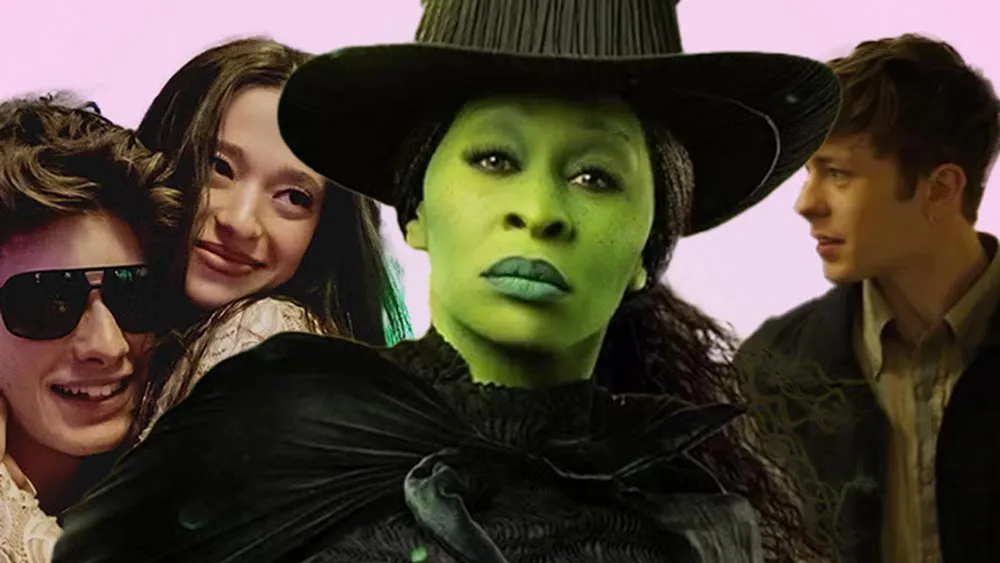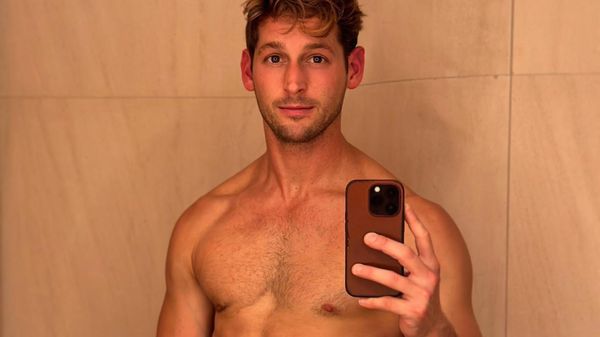March 18, 2016
Sweet and Saucy :: Maurice Emmanuel Parent on 'Bootycandy'
Kilian Melloy READ TIME: 14 MIN.
For years, Maurice Emmanuel Parent has been impressing Boston theater audiences with his range and stage presence. Everything from big musicals ("The Color Purple," "Far From Heaven") to searing drama ("The Convert") to comedy -- including SpeakEasy Stage Company's current production of "Bootycandy."
The play is a comedy by Robert O'Hara, who has created a theatrical experience akin to tying shoelaces: Structurally, the play winds around itself, twining "real" and "fictional" characters into an impossible tangle that you're laughing too hard not to swallow whole. The play was nominated in the year of its premiere, 2014, for a Drama League Award.
Maurice Emmanuel Parent stars as Sutter, a gay African American playwright who, early in his life, ponders the possibilities of what an adventurous young man might do with his "bootycandy" -- his mother's word for his private parts -- and the bootycandies of other guys, activities that could not only be fun, but even inspire world peace. Later on, as an adult, with world peace in short supply, Sutter is willing to settle for the fun -- though there are, of course, complications upon complications involved, all of which makes his love life comically and dramatically fraught.
Johnny Lee Davenport, Johnny Kuntz, Jackie David, and Tiffany Nichole Greene share the stage with Maurice Emmanual Parent, taking on various roles (mother, stepfather, grandmother, drunken trick, a couple of not-quite-standard preachers), creating a perfect, and insanely funny, storm.
Maurice Emmanuel Parent chatted with EDGE about his recent turn in "The Convert" and the delicious antics of his feisty gay character in "Bootycandy."
EDGE: I would have loved to have interviewed you for "The Convert," but I was delighted to find out you were in "Bootycandy," which is being produced right on the heels of "The Convert." Has it been a big shift to go from one to the other?
Maurice Emmanuel Parent: Oh, yeah! [Laughs] It's a big shift mentally. But it's cool to be surrounded by such great people. That helps with the shift between the two. They both are challenging and rewarding in unique ways, but definitely they are very different from each other.
EDGE: You had to put on quite an accent for "The Convert." What do you have to do for "Bootycandy?"
Maurice Emmanuel Parent: I don't have to do any accent work. It's just my voice with a little bit of change, mostly ages: At one point I'm eight years old; at another point I'm about 15. Just thinking back to what my voice was like at those ages, at least as much as I can remember, and playing with that, but nothing like the Shona-influenced English of "The Convert." I also draw influence from the kids I teach.
EDGE: Speaking of shifts, you have done a lot of plays with SpeakEasy: "Some Men," "Far From Heaven," "The Color Purple," "The Motherfucker With the Hat," and now "Bootycandy," but you've also been in a slate of plays with ASP. What's it like doing so much Shakespearean theater and such unmistakably contemporary work? Is there really such a difference there as we might think?
Maurice Emmanuel Parent: I love Shakespeare, it's just -- this may sound silly, but the plays themselves influence a shift in me so I feel that with Shakespeare, the rhythm and the meter automatically bring out a different performance aspect in me. It's the same with modern plays like "Bootycandy": A character who screams "Do you wanna fuck me?!" brings out a different guy from within me than, "If music be the food of love, play on." Would, you know?
The company's also strong and helpful with these things, like with the dialects. We had amazing dialect work with "The Convert," and with ASP, I'm one of the company members and the dialect people from within the company, and also from outside it, help us -- help me, in particular -- with the rhythm and being true to the meter. With SpeakEasy and "Bootycandy," there's so much support for everything! We did a video where I'm on the street asking people what "bootycandy" is, and it's insane and amazing. That opportunity helped to bring out a different side of me that I can tap into on stage.
EDGE: In addition to being a busy actor on Boston stages, you are also a lecturer at BU in Music Theater. What's a typical lecture like? Singing? Or hard work and endless technique training? Anatomical lessons on posture and breath support?
Maurice Emmanuel Parent: It's a studio class in a performance space, so we're performing in every class.
EDGE: So you are singing in class!
Maurice Emmanuel Parent: Mm-hmm. Maybe you're a clairvoyant, you need your own hotline or something. [Laughter] It's an acting technique class, not so much a singing technique class, so I don't give them notes on how they sing, I'm more about understanding the song, and the performance of it, digging into the script itself and the scene that the song came from and making songs come to life as sung monologues.
EDGE: How did your starring in "Bootycandy" come about?
Maurice Emmanuel Parent: I hounded [SpeakEasy Stage Company Producing Artistic Director] Paul Daigneault! When I was in New York one of my survival jobs was at the box office of Playwrights' Horizons, and my old boss from there emailed me one day and said, "We're doing a play here that's called 'Bootycandy.'" He went to Emerson and actually he was in the "Spotlight" movie, he played one of the victims, so he's doing great. Anyway, he emailed me, he knew I was doing a lot with SpeakEasy, and he said, "You should come down and see this play 'Bootycandy' and see if you can pitch it to a company in Boston, maybe SpeakEasy, to produce it. It is amazing. It's right up your alley.' I thought, 'Yeah, man, I gotta get down there and see it!'
Of course, it's hard to get away when you're a teacher, so I missed it. But then, maybe a month or two later, SpeakEasy announced they were doing it. As soon as I read that, I emailed Paul and said, "Please, can I please be seen for this role, please?" [Laughter] Then I auditioned with [director] Summer [L. Williams] and Paul and that was that.
EDGE: I love how at the SpeakEasy website there's a bit of text that says, "This play is called 'Bootycandy,' so they'll be talking about booty, and showing some booty. That means strong language, mature themes, and full nudity. You've been warned." Going into this, did the prospect of nudity on stage bother you at all?
Maurice Emmanuel Parent: Not at all, I revel in it! Like I was saying before, the text of a play and the world of the play brings out different sides of me. Reading the play I literally laughed out loud. I cannot read the script without laughing out loud in this annoying way; other people look at me like I'm crazy. I think it's hilarious and brilliant. It's well written; it's so real, and it's so fantastic. It goes into the absurd and the crazy and then it turns around and gives you something really touching and jarring and sobering.
EDGE: The show's posters have you in a sexy pose, so I'm guessing you're the one who shucks his kit on stage?
Maurice Emmanuel Parent: I'm not going to give away who shows their booty. You've got to come and see.
EDGE: I'll be happy to come and see. [Laughter] But I have to ask, this play is drawn from the experience of the playwright, Robert O'Hara, being black and being gay. Are you playing more of the Robert O'Hara character, or is the Robert O'Hara experience divided up among the characters?
Maurice Emmanuel Parent: I would say my character, Sutter, is not directly Robert O'Hara. However I've read a few interviews of his, and he said that he added aspects of his own life story to Sutter's journey, and also into some of the other characters' moments. He also went off into the fanciful and the absurd. I don't actually know which parts are like his personal story, but there are some that I would guess he must have gone through. In one scene four of us play playwrights. One of the characters has the last name of O'Brien, and someone makes the comment that it's not normal for a black person to have the last name O'Brien. I'm pretty sure he must have heard that [in real life], having the last name O'Hara. And I read an interview that there's one scene around the dinner table that's similar to his own experiences, but I don't think anything's... well, actually, I don't even know what in the play is verbatim from his experiences. But I know there are moments based on things from his experience, which he expanded on in the piece.
As Sutter, it's kind of the same way, as I see it, where it's not linear storytelling, it's vignettes, it's kind of like 'The Colored Museum.' The through-line is Sutter, and for me it's a question of race, and sexuality, and identity, and things like that. And it's also an exploration of life through art. Sutter's inside the vignettes, and he's also outside the vignettes, and he has to answer for the vignettes. He's inside them and also making them happen -- it's a comment, for me as an artist, on what does your art say about you, what can you learn about yourself through art? Why do you create certain things? Are you trying to learn more about yourself? Others?
The beauty of all this is the audience, in the middle of all this nonsense and hilarity, is left to ask questions of itself. Hopefully they walk away wondering what kind of statements we can make with art, particularly in the medium of theater. They also hopefully will have thoughts on the intersection race, sexuality, family and faith. And will have laughed until they cried!
EDGE: You play a gay character in "Bootycandy," but I found myself wondering about Chilford, your character, in "The Convert." I don't mean to stereotype, but he's pretty fussy and he doesn't seem too interested in this beautiful young woman who comes to live in his home...
Maurice Emmanuel Parent: I toyed with the idea that Chilford might be gay, but I thought that was too easy. I think Chilford might be a person who is utterly disconnected from lust and sex. He could care very deeply for the people around him, but what is does that mean exactly?
I liked the idea of the pure sense of mission a priest is supposed to have - in spite of scandals like the ones feature in "Spotlight," at the core of it -- as far as my lapsed Catholic ex-wannabe altar boy self can understand it - is a sense that the calling someone has to bring people to God is so powerful that it overwhelms and takes precedence over needs of the self. This includes marriage, sex and material possessions. It's completely selfless. Is that actually humanly possible? I don't know. I think that's why, as is the case in the "The Convert," when we repress certain desires within ourselves, it can cause frictions and eventually explode in unexpected ways. There were certain things going on with Chilford in certain scenes, like in the last scene where he completely turned over everything he believed in - everything I'd describe as the essentials for a priest - he threw all that out the window because this woman who meant everything to him as she was his perfect prot�g�, was going to be killed.
That seemed like a more interesting choice: What does it feel like for a person who pushes down his desires, doesn't allow himself to feel certain things, until they force themselves up to the surface?
EDGE So in a way Sutter is the anti-Chilton because he's way outside of the box!
Maurice Emmanuel Parent: Yeah, that's a good call on that one! For various reasons he revels in his sexuality, he delights in his developing sexuality.
EDGE: Is it easier to pay gay now than it was, say, six years ago?
Maurice Emmanuel Parent: I would say yes, in that more and more plays are being produced and written and accepted by the masses, so gayness is about many other things. This play is about race, homosexuality and family among other things. In earlier times, the point of a play [that featured gay characters] was gayness; now we are becoming more accepting of gay life, we can make more varied and individual statements. The power of theater is telling the story of a person, and of people. This is a play that happens to have have gay themes; but to say it's just 'a gay play' is selling it short, because it's telling a [larger] story ][even if it is] through a homosexual lens.
EDGE: Yes, I understand what you mean, but it still feels important and even a little transgressive for plays to have major gay characters and themes; despite the fact that we've made great strides forward, and now we have marriage equality, in other ways it feels like we are regressing.
Maurice Emmanuel Parent: Yes, with certain political candidates. With so much progress made, there's going to be backlash because of it. As a society we made huge progress and gains over the last four or eight years, and the pushback is in some ways terrifying: It shows an ugly aspect of human nature.
EDGE: But what better way to push back against that backlash than through humor? The SpeakEasy web site tells us "Bootycandy" is "saucy"; and "shockingly funny," and I think that might be just the thing we need right now.
Maurice Emmanuel Parent: I completely agree. And at the crux of it, there's no point where the play is going to be preachy or stand on a soapbox, but it's presenting the life of this person with examples of what repression looks like; the ugly side of struggling with sexuality, and also the beautiful and joyous parts of what sexuality can be. Hopefully people can come away feeling empowered about themselves, seeing how a person can work hard to claim their identity, and love it, and own it. They'll be inspired to do the same thing, and to fight against anything that would block that.
EDGE: And race must enter into that too, in the case of this play.
Maurice Emmanuel Parent: It does. It uses some themes that are know in a lot of black lives, like the church, the black family structure, the language and slang, but I still think it's accessible to all. I think the way it uses comedy is as a way in. Race is part of it, and it takes a few different forms, and there are moments when it talks about race in an almost meta way, where we are playing playwrights talking about the issue of race in plays written by black playwrights.
EDGE: You're starring with some great actors: Johnny Lee Davenport, John Kuntz, Jackie Davis, and Tiffany Nichole Greene. You must be having a great time with your castmates.
Maurice Emmanuel Parent: Oh, I hate them! I hate them a lot.
EDGE Really? Tell me the dish!
[Laughter]
Maurice Emmanuel Parent: Just kidding, I love them! But they make me laugh in the middle of these scenes. I'm supposed to be serious and they are so brilliant and hilarious. I've seen it all, but seriously, I have never been so terrified of cracking in the middle of a scene than in this play. I've kind of figured it out, and know the mental gymnastics I need to be doing to not crack up and laugh for all but one scene, and that one scene gets me every time! I am terrified!
But yes, they are all great. And I am astounded at how great Summer is at letting us play and explore. Every time I come in and do scenes with them, they are more individual in terms of their characters. It's a fantastic group. I couldn't ask for better people to share the stage with.
And Summer Williams is brilliant! I've never worked with her before. She's smart, and fun, and clear with her direction. The stuff I've been doing the last few months is the reason why I'm glad I decided to finally leave New York and move to Boston five years ago after having been working here since 2006: The people I'm collaborating with, the work we get to do, and the response, it's just life changing.
"Bootycandy" continues at the Boston Center for the Arts through April 9. for tickets and more information, please go to http://www.speakeasystage.com
Kilian Melloy serves as EDGE Media Network's Associate Arts Editor and Staff Contributor. His professional memberships include the National Lesbian & Gay Journalists Association, the Boston Online Film Critics Association, The Gay and Lesbian Entertainment Critics Association, and the Boston Theater Critics Association's Elliot Norton Awards Committee.







